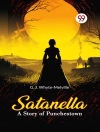Mary Shelley’s ‘The Fortunes of Perkin Warbeck’ is a historical novel that intricately weaves the themes of identity, usurpation, and the fluidity of history. Set during the tumultuous period of the late 15th century, it delves into the life of Perkin Warbeck, a figure who claimed to be the murdered prince, Richard, Duke of York. Shelley’s prose is laced with Romantic elements, reflecting her interest in individual experience against a backdrop of political intrigue. The novel stands as a commentary on the nature of truth and fiction, inviting readers to examine how narratives shape historical perception. Mary Shelley, best known for her groundbreaking work ‘Frankenstein, ‘ was profoundly influenced by the sociopolitical upheavals of her time. Her exposure to radical ideologies and her own experiences of loss and isolation found resonance in the life of Warbeck, whose quest for identity reflects Shelley’s own existential inquiries. Throughout her life, she sought to challenge societal norms and explore complex character motivations, which is clearly mirrored in this work. I highly recommend ‘The Fortunes of Perkin Warbeck’ to readers interested in historical fiction that challenges conventional narratives. Shelley’s exploration of legitimacy, power, and the human condition remains relevant today, prompting reflection on the ways we construct our own identities in a complicated world.
عن المؤلف
Mary Wollstonecraft Shelley (1797-1851) remains a towering figure in the literary world, largely celebrated for her Gothic masterpiece ‘Frankenstein; or, The Modern Prometheus’ (1818). However, her literary corpus extends beyond this singular work, exemplifying her deep engagement with Romantic and historical themes. Among her lesser-known but significant contributions is ‘The Fortunes of Perkin Warbeck’ (1830), a historical novel that reflects Shelley’s fascination with identity and the fluid boundaries between truth and fiction, much like her earlier works.
Shelley’s narrative craft in ‘Perkin Warbeck’ showcases her scholarly depth and commitment to historical accuracy, intertwined with her quintessential Romantic flair. This novel — a fictional recounting of the life of the 15th-century pretender to the English throne — received a mixed reception but undoubtedly added a rich layer to Shelley’s exploration of the human condition and political power. The scholarly style Shelley employs is informed by her personal erudition and the intellectual milieu shaped by her parents, philosopher William Godwin and feminist advocate Mary Wollstonecraft, and her husband, poet Percy Bysshe Shelley. Though the public may not remember her as vividly for ‘Perkin Warbeck’ as for ‘Frankenstein’, it contributes to our understanding of Shelley’s literary style, which often involves a complex interplay between societal constructs and individual agency.












